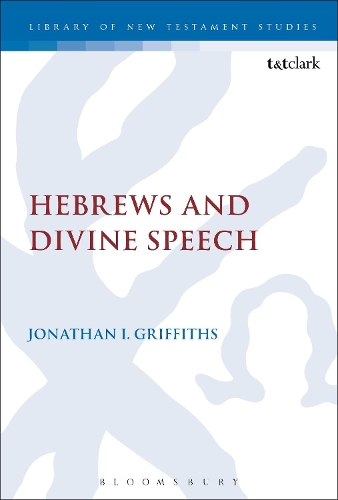
Hebrews and Divine Speech
(Paperback)
Available Formats
Publishing Details
Hebrews and Divine Speech
By (Author) Dr Jonathan I. Griffiths
Bloomsbury Publishing PLC
T.& T.Clark Ltd
25th February 2016
United Kingdom
Classifications
Tertiary Education
Non Fiction
Criticism and exegesis of sacred texts
New Testaments
227.8706
Physical Properties
Paperback
216
Width 156mm, Height 234mm
313g
Description
The theme of divine speech appears at the opening of the Hebrews (1.1-2) and recurs throughout the book, often in contexts suggesting connections to other areas of scholarly interest (christology, soteriology, cosmology, and the writers understanding of the nature of his discourse). Griffiths begins with a consideration of the genre and structure of Hebrews (offering a new structural outline), concluding that Hebrews constitutes the earliest extant complete Christian sermon and consists of a series of Scriptural expositions. Griffiths then turns to consider Hebrews' theology of divine speech through an exegetical analysis of eight key passages (with particular attention to the writers use of the terms logos and rhema), and finds that, for the writer, Gods speech is the means by which the place of divine rest is accessed, and is supremely expressed in the person of his Son. Griffiths concludes that the writer presents his sermon as communicating the divine word and effecting an encounter between his hearers and the God who speaks. Analysis of the exegetical data shows that Hebrews presents Gods word, which finds full expression in the incarnate Christ, as the central means by which salvation is made available and the place of divine rest is accessed. The study finds that the terms logos and rhema are used with a high degree of consistency to signify forms of divine speech, logos usually signifying verbal revelation (and three times specifically identifying the authors own discourse) and rhema typically signifying non-verbal revelation in the cosmos. The investigation leads to the ultimate conclusion that the author believes that, through his discourse, he himself communicates that divine word and effects an encounter between his hearers and the God who speaks.
Reviews
This is a fine work of scholarship that fronts and examines a major emphasis of Hebrews and a crucial theme for theology. Hebrews is indubitably a discourse that centers on Gods saving speechthat is, his speech in and as the Son, in the form of the promise delivered in the word of the proclaimed gospel (1:14; 4:1213; 12:2529). Yet this broad affirmation requires testing and refinement, which is what Griffiths pursues. His successive, close examinations of 1:14; 2:14; 4:216; 5:116:12; 6:137:28; 11:3; 12:1829; and 13:7, 17, 22 are necessary reading for all exegetes. -- Jon C. Laansma * Journal of the Evangelical Theological Society *
Author Bio
Jonathan I. Griffiths read theology at Oxford, UK and completed his New Testament PhD at Cambridge, UK. He is editor of The Perfect Saviour: Key Themes in Hebrews (2012) and is a Tutor on the PT Cornhill Training Course, UK.
